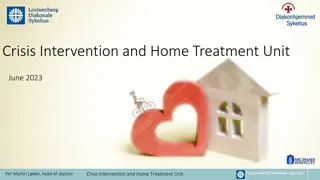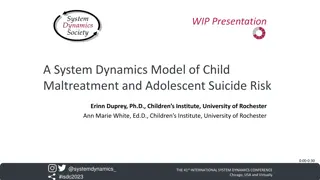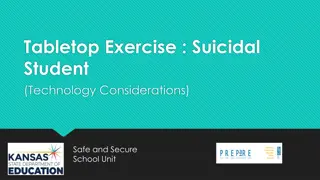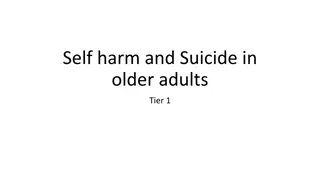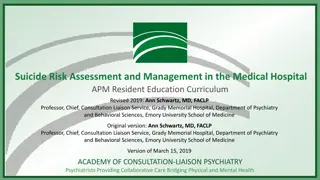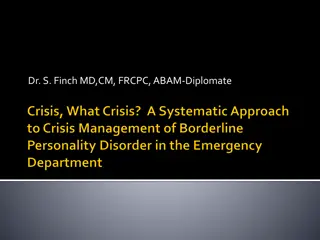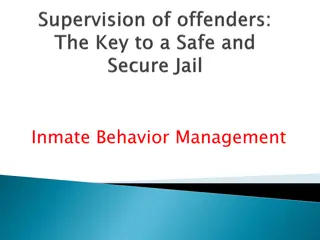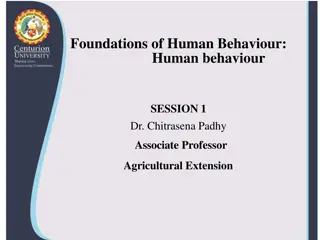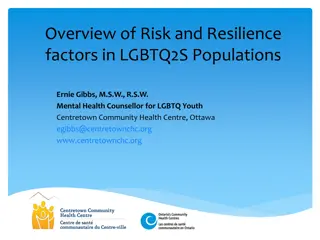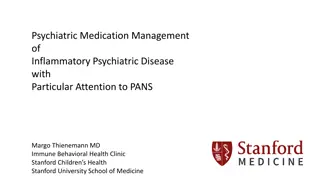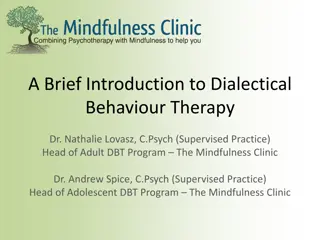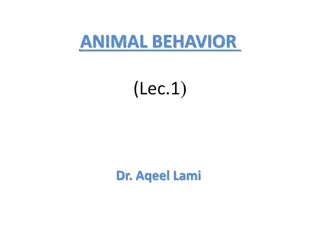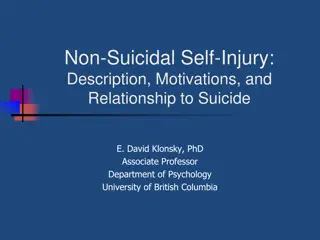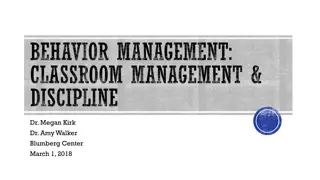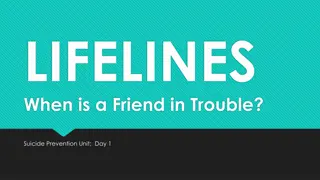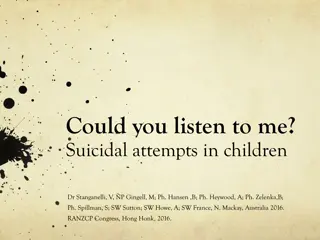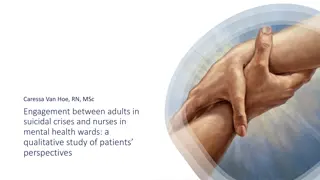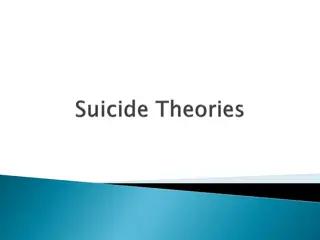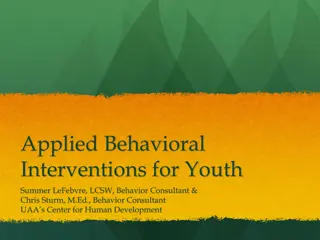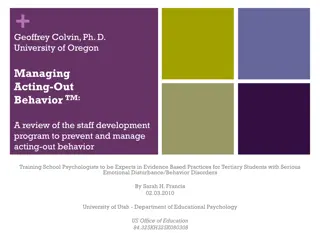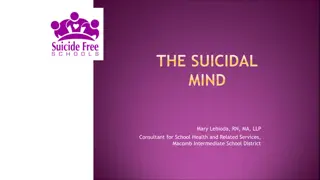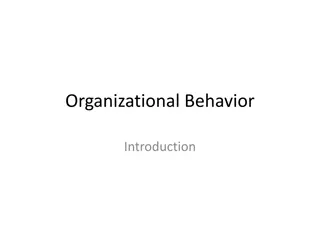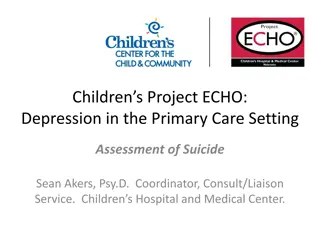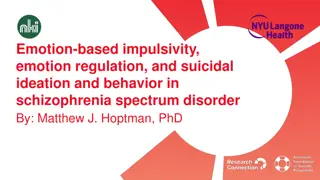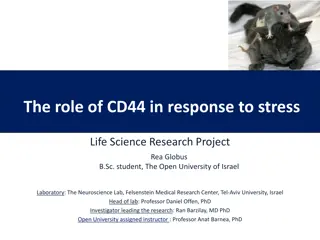Function Based Thinking
Function-based thinking in Missouri Schoolwide Positive Behavior Support, emphasizing data-based decision-making, mission clarity, and effective teaching practices. Understand how behavior is related to the environment and how environmental interventions play a key role in shaping expected behaviors
6 views • 27 slides
ERIKA'S.LIGHTHOUSE
This program, inspired by Erika who battled depression, aims to educate young people about depression, its symptoms, and stigma. It emphasizes the importance of seeking support, self-care, and understanding suicidal thoughts. The curriculum covers signs of depression, self-harm, and the impact of st
0 views • 15 slides
Addressing Predatory Behavior in the Fellowship
Predatory behavior, especially towards vulnerable members, is a concerning issue in the fellowship. This behavior includes unwelcome advances, exploitation of power dynamics, and institutional sexism. The discussion on predatory behavior necessitates honest dialogue and a united approach for a safer
3 views • 13 slides
Comprehensive Crisis Intervention and Home Treatment Unit Overview
The Crisis Intervention and Home Treatment Unit, led by Per Martin L.ken, offers a variety of services including inpatient clinics, outpatient clinics, community services, and mobile crisis support for individuals facing challenges such as psychosis, suicidal issues, and eating disorders. The unit p
0 views • 7 slides
System Dynamics Model of Child Maltreatment and Adolescent Suicide Risk
Youth experiencing child abuse/neglect are at higher suicide risk. Lack of school-based prevention programs prompts study on increasing protective factors and reducing suicidal behaviors. A preliminary model within the school context aims to inform a prevention program.
0 views • 4 slides
School Crisis Management in the Digital Age
Addressing a school crisis involving a suicidal student through a tabletop exercise reveals the importance of adapting to technology considerations. From identifying warning signs, involving law enforcement, managing rumors, to leveraging virtual crisis rooms, the crisis team navigates challenges in
0 views • 9 slides
Analysis of Hamlet's First Soliloquy in Act 1, Scene 2
The first soliloquy in Shakespeare's "Hamlet" captures the protagonist's deep melancholy and internal turmoil following his father's death and his mother's hasty marriage to his uncle. Hamlet expresses suicidal thoughts, seeing life as futile and the world as a corrupted place. This soliloquy sets t
0 views • 7 slides
Clinical Excellence in Nursing: Suicide Risk Assessment and Protocol Training
Welcome to SCENS where simulations focus on recognizing and managing suicidal ideation in nursing services. This scenario highlights the importance of suicide risk assessment protocols, effective communication with patients, and key warning signs to watch for. The background information sheds light
0 views • 14 slides
Understanding Consumer Behavior in Marketing
The design of a marketing program starts with understanding consumer behavior. Consumers, as the end users, play a crucial role in shaping market trends. Producers seek insights into consumer personas, market behaviors, and influencing factors. Management focuses on the consequences of consumer beha
2 views • 26 slides
Understanding Self-Harm and Suicide in Older Adults
Exploring the definition, risk factors, incidence rates, and staff approaches related to self-harm and suicide in older adults. It emphasizes the seriousness of self-harm in this demographic, the associated risk factors, and the importance of responding with compassion and support. The content delve
0 views • 21 slides
Understanding Psychology: The Science of Behavior and Mental Processes
Psychology is the scientific study of behavior and mental processes. Psychologists study both observable behavior and private mental processes. The primary goals of psychology are to describe, understand, predict, and control behavior. Different branches of psychology, such as applied psychology, cl
2 views • 29 slides
Suicide Risk Assessment and Management in Medical Hospitals
Understanding suicide definitions, risk factors, and behaviors is crucial in medical settings for effective assessment and management. Emphasis is placed on recognizing intent, distinguishing between suicidal acts and parasuicidal behaviors, and considering factors like knowledge of lethality and co
0 views • 52 slides
Understanding Borderline Personality Disorder (BPD) Crisis Presentations
Borderline Personality Disorder (BPD) is a common and challenging disorder, especially in clinical populations. With prevalence varying from 1-2% in the general population to up to 25% in agitated emergency patients, BPD often presents in crisis situations, leading to suicidal behavior and frequent
1 views • 41 slides
Understanding Inmate Behavior Management in Correctional Settings
Inmate Behavior Management in correctional facilities involves supervising inmates, implementing corrective discipline, and fostering a fair and consistent environment. It emphasizes the importance of behavior management plans, identifying undesirable traits in supervision, and passing educational a
0 views • 19 slides
Understanding Human Behavior: Foundations and Factors
Human behavior is a multifaceted subject influenced by genetic makeup, culture, and individual values. It encompasses both overt actions and covert thoughts, a product of the individual and environmental factors. Psychologists study behavior from visible (overt) actions like playing football to inne
0 views • 20 slides
Understanding Normal and Abnormal Behavior: Perspectives and Definitions
Normal behavior varies from person to person and society, influenced by individual preferences and societal norms. Abnormal behavior is characterized by an inability to function effectively or personal discomfort. The concept of normality and abnormality in psychology raises complex questions about
2 views • 8 slides
Risk and Resilience Factors in LGBTQ2S Populations
This presentation by Ernie Gibbs, a Mental Health Counsellor, explores risk and resilience factors impacting LGBTQ2S youth. It delves into terminology, risk factors like depression and violence, as well as resilience factors such as family acceptance and access to medical transition services. The di
0 views • 10 slides
Lessons Learned from Utilizing ACT to Understand and Prevent Suicide in Veterans
Dr. Debbie Sorensen, from Denver V.A. Medical Center, presented on utilizing Acceptance and Commitment Therapy (ACT) to comprehend and address suicidal ideation (SI) among veterans. The VA training program in ACT for depression showcased positive outcomes in reducing SI and depression symptoms. The
0 views • 14 slides
Management of Inflammatory Psychiatric Disease with Focus on PANS in Pediatric Patient
Dr. Margo Thienemann discusses the psychiatric medication management of a 10-year-old boy with inflammatory psychiatric disease, particularly focusing on Pediatric Acute-onset Neuropsychiatric Syndrome (PANS). The patient presented with various symptoms including compulsions, mood swings, OCD, oppos
0 views • 45 slides
Understanding Dialectical Behaviour Therapy (DBT)
Dialectical Behaviour Therapy (DBT) is a comprehensive cognitive-behavioural treatment developed by Dr. Marsha Linehan to help individuals with chronic suicidal tendencies and Borderline Personality Disorder. DBT focuses on validation, dialectics, and treatment hierarchy to address dysregulation and
0 views • 70 slides
Understanding Human Behavior: Insights for Social Workers
This material delves into the intricacies of human behavior, exploring factors influencing behavior such as heredity, environment, intelligence, needs, and motives. It covers the concept of human behavior, stages in life from conception to old age, and theories of human development by eminent psycho
2 views • 71 slides
Understanding Animal Behavior and Ecology
Animal behavior encompasses a range of activities such as feeding, breeding, and social interactions. Ethology focuses on studying behavior in natural environments, while behavioral ecology examines ecological aspects like predator-prey interactions. Sociobiology delves into the evolution of social
3 views • 5 slides
Understanding Non-Suicidal Self-Injury in Youth and Adolescents
Non-Suicidal Self-Injury (NSSI) is a common issue among youth and adolescents, often misunderstood as attempted suicide. This behavior involves intentional self-harm without suicidal intent, such as cutting, burning, and scratching. It is crucial to distinguish NSSI from suicide attempts due to thei
0 views • 124 slides
Understanding Behavior Management in Classroom Settings
Explore the essential topics of behavior management, classroom strategies, and discipline in educational settings. Delve into the functions of behavior, impact of trauma on learning, and effective management techniques. Learn how to identify underlying reasons for student behaviors, discuss behavior
0 views • 76 slides
Targeting Emotions to Facilitate Behavior Change in Older Adults
Efforts in changing health behavior have traditionally focused on social and cognitive factors, but recent evidence highlights the importance of affective states in decision-making and behavior change. Janey Peterson discusses the role of emotions in achieving and sustaining behavior change to benef
0 views • 11 slides
Understanding Suicide Prevention for Young People
In this series of visual aids, important information about suicide prevention is highlighted. The images cover statistics, misconceptions, and facts surrounding suicide, emphasizing the importance of taking suicidal communications seriously and debunking myths. It sheds light on the prevalence of su
0 views • 21 slides
Understanding and Addressing Suicidal Attempts in Children
Suicidal attempts in children under 12 are rare but pose significant risks that increase with age. Factors such as bullying, neglect, abuse, and family dynamics play crucial roles. A 10-year analysis reveals insights into admissions for suicidal gestures in pre-pubertal children, highlighting the ne
0 views • 22 slides
Grading Criteria for Effort and Behavior in Educational Reporting
Effort and behavior in educational settings are evaluated based on criteria ranging from Excellent to Causing Concern. Pupils demonstrating excellent behavior show respect, responsibility, and positive engagement in learning. Those with good behavior exhibit cooperation and respect for others, albei
0 views • 9 slides
Perspectives on Engagement between Adults in Suicidal Crises and Mental Health Nurses
Patients in suicidal crises perceive their interactions with mental health nurses as crucial for feeling nurtured, safe, and supported. The study explores how compassionate engagement aids in alleviating suicidal ideation and fostering trust, emphasizing the significance of interpersonal relationshi
0 views • 18 slides
Significance of Psychological Theories in Understanding Suicidal Behavior
Psychological theories play a crucial role in guiding research, clinical work, and the development of new hypotheses related to suicidal behavior. The Interpersonal-Psychological Theory of Suicidal Behavior emphasizes social forces, such as disturbed regulation of individuals by society, social inte
0 views • 14 slides
Understanding Applied Behavior Analysis (ABA) for Youth Interventions
Applied Behavior Analysis (ABA) is a science focusing on improving human behavior by increasing desired behaviors, teaching new skills, and generalizing behaviors. ABA emphasizes observable behaviors, measurement of behavior change, and the use of interventions in various settings like classrooms an
0 views • 25 slides
PBIS Expectations and Behavior Flowchart
The PBIS flowchart outlines behavior expectations and interventions for minor and major incidents in a school setting. It covers disrespectful behavior, disruption, defiance, property damage, theft, possession of weapons, and more. The flowchart guides teachers and staff on managing and addressing s
0 views • 6 slides
Managing Acting-Out Behavior: A Staff Development Program Review
This review discusses a staff development program created by Geoffrey Colvin, Ph.D., from the University of Oregon, focusing on preventing and managing acting-out behavior in students with emotional disturbance or behavior disorders. The program includes video presentations, strategies for behavior
0 views • 22 slides
Understanding the Suicidal Mind: Insights and Perspectives
Exploring the complex facets of suicidal behavior, this content delves into the psychological pain, personality traits, and theories associated with individuals contemplating or attempting suicide. It sheds light on the underlying emotional turmoil driving suicidal actions and highlights the need fo
0 views • 31 slides
Impact of the Current Pandemic on Mental Health and Suicide Rates in Scotland
Samaritans Scotland provides valuable insights into the effects of the current pandemic on mental health and suicidal thoughts among individuals. The service has observed an increase in anxiety and distress among callers, with a notable rise in first-time callers and those struggling to talk on the
0 views • 21 slides
Understanding Organizational Behavior and Individual Behavior
Organizational Behavior (OB) is a multidisciplinary field that combines knowledge from various disciplines to study and manage organizations effectively. It emphasizes the application of this knowledge to enhance organizational effectiveness and the well-being of participants. OB is a useful concept
0 views • 38 slides
Understanding Depression and Suicide Risk Assessment in Primary Care
This presentation explores the strong correlation between depression and suicide, emphasizing the importance of assessing suicide risk in primary care settings. It covers strategies for interacting with individuals struggling with depression and suicidal ideation, as well as discussing risk factors
0 views • 19 slides
Function-Based Behavior Support Plans: A Comprehensive Guide
Explore the process of developing Function-Based Behavior Support Plans (BSP) using Functional Behavioral Assessment (FBA). Understand the concepts of function and functional behavior assessment, learn how FBA/BSP fits within a multi-tiered support system, and practice developing BSP for students. D
0 views • 74 slides
Impulsivity and Suicidal Ideation in Schizophrenia Spectrum Disorder
This study by Matthew J. Hoptman, PhD, explores the relationship between emotion-based impulsivity, emotion regulation, and suicidal ideation and behavior in schizophrenia spectrum disorder. It examines the dimensions of impulsivity, including urgency, in individuals with schizophrenia compared to h
0 views • 22 slides
The Role of CD44 in Response to Stress: Research Project at The Open University of Israel
The project explores the involvement of the CD44 molecule in stress response, particularly focusing on its role in cell adhesion, migration, and inflammatory processes. Research findings suggest that CD44 may be implicated in neuro-immune dysfunction related to conditions like depression and suicida
0 views • 22 slides



